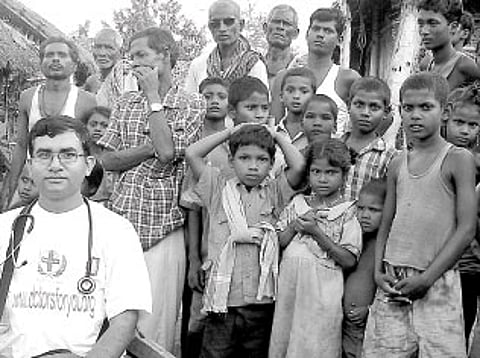

What started off as an initiative to make people donate platelets became a lifetime calling for Dr Ravikant Singh who while studying MD took up the task of providing free immediate medical services to people living in areas affected by natural and man-made disasters. Though his service to the people cost him a semester, he did not give up the initiative. He speaks of how his NGO, Doctors For You (DFY), happened and how he resisted the lure of money, for the higher good.
While pursuing MD in community medicine, Ravikant led a team of medicos to Bihar when it was affected by floods in 2008 and offered medical services to the people there. Apart from a semester, he also lost a dear colleague to an accident during the service. “While providing health facilities to flood victims in Bihar, my colleague Chandrakant Patil lost his life when he was hit by lightning, and I returned to Maharashtra with his body. However, two days after his death I got to know that all the doctors left the area, which was disappointing.” Determined, he returned to the area with a small team of committed doctors and stayed there for five months. “There were women giving birth by the roadside and scores of people who were in dire need of medical attention. I always believed in serving people through this profession, so I felt that helping those people was more important than my academics,” says Ravikant, who eventually completed his MD in December 2010, seven months behind schedule.
Winner of SAARC Youth Award 2009 for outstanding work done during the aftermath of a natural disaster (Bihar Floods, 2008), Ravikant established DFY in 2007 along with a few of his colleagues when Mumbai witnessed an epidemic of malaria, dengue and leptospirosis. “Many people lost their lives because of the acute shortage of blood components like platelets, despite their diseases being curable. We conducted a blood and platelet drive, which turned out to be a hit, as the number of donors doubled. Later we organised many such drives. Realising we are bound by a humanitarian urge apart from professional congruity, we decided to start DFY,” he reminisces.
He now dedicates 90 per cent of his time to DFY and the rest is spent on taking public health lessons at a medical college in Kolhapur. DFY has 500 members including doctors, nurses and pharmacists and approximately 1,000 registered volunteers apart from 50 full-time employees.
During times of disaster, the organisation relies on individual donations in the form of cash or supplies like medicines. At other times, DFY generates money through consultation charges for training programmes and working on funded projects. The money generated is used to pay salaries of employees and to take care of management expenses.
DFY visited Andhra Pradesh and Karnataka during the 2009 floods, Odisha during the 2011 floods, Assam in 2012 and Uttarakand during the floods that ravaged it last year. DFY also has health centres in Mumbai and Bihar, and trains doctors, police and paramedics on emergency medical aid. His team won the British Medical Journal’s ‘Best Medical Team in Crisis Zone’ award in 2011. “All the medical personnel working in flood-affected areas risk their lives to offer health services — from crossing rivers to travelling in treacherous paths,” says the 32-year-old.
He credits his family for their support. His dentist wife is part of DFY and the couple are not rattled by the fact that their friends make more money than them. “I got over the lure of money when I saw people in dire need of medical services.” He believes it is high time the quality of medical services provided to people in India is improved.
Having been helping people for the past three years, Ravikant’s future plans revolve around providing solutions for three major problems. “Poor quality of maternal and child healthcare, lack of a pre-planned disaster response and increasing trend of non-communicable diseases are some of the challenges affecting our nation. We are already working on the first two.” Driving the message home to budding doctors, Ravikant says if they are really committed to serving people, then help will come from all quarters including government and international organisations.
— shiva.shanker@newindianexpress.com